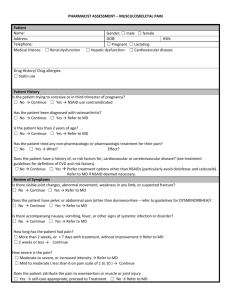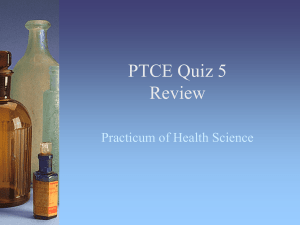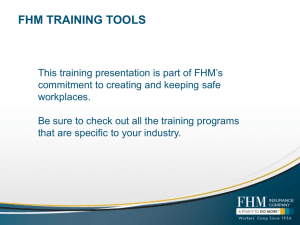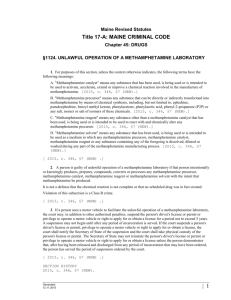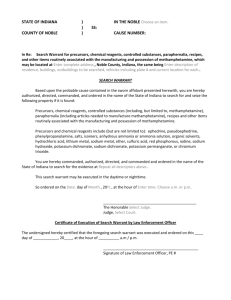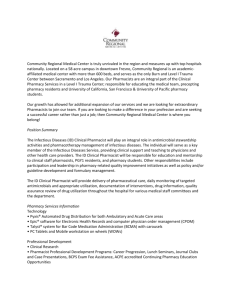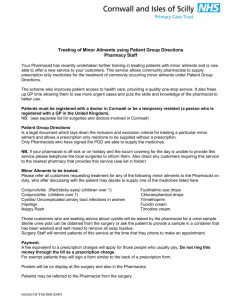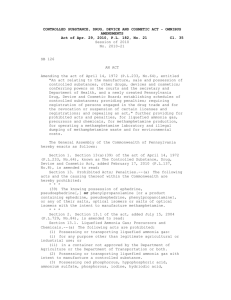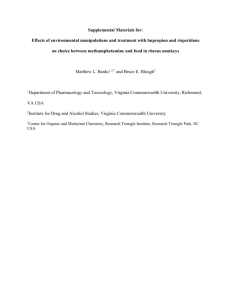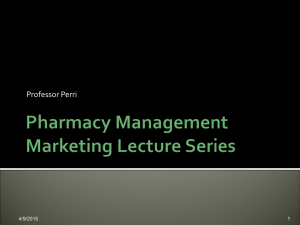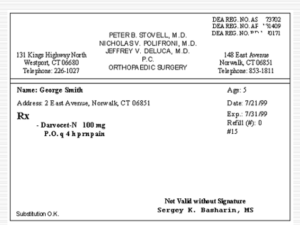Methamphetamine 1. Senate Bill 1751 (Norris) House Bill 1574
advertisement
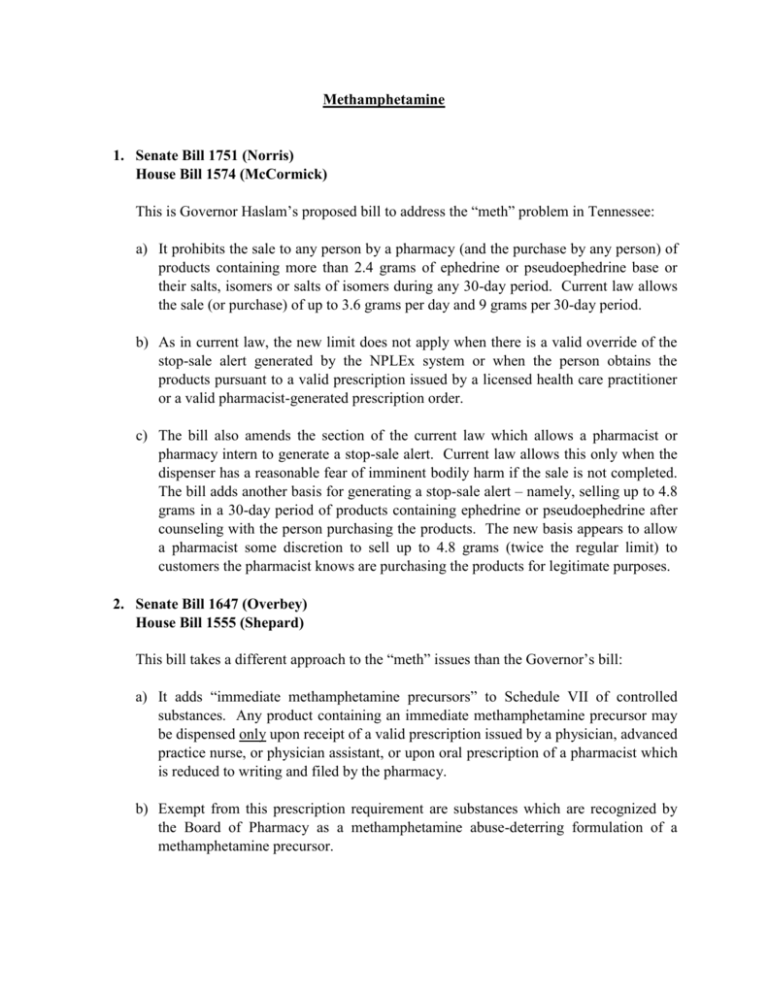
Methamphetamine 1. Senate Bill 1751 (Norris) House Bill 1574 (McCormick) This is Governor Haslam’s proposed bill to address the “meth” problem in Tennessee: a) It prohibits the sale to any person by a pharmacy (and the purchase by any person) of products containing more than 2.4 grams of ephedrine or pseudoephedrine base or their salts, isomers or salts of isomers during any 30-day period. Current law allows the sale (or purchase) of up to 3.6 grams per day and 9 grams per 30-day period. b) As in current law, the new limit does not apply when there is a valid override of the stop-sale alert generated by the NPLEx system or when the person obtains the products pursuant to a valid prescription issued by a licensed health care practitioner or a valid pharmacist-generated prescription order. c) The bill also amends the section of the current law which allows a pharmacist or pharmacy intern to generate a stop-sale alert. Current law allows this only when the dispenser has a reasonable fear of imminent bodily harm if the sale is not completed. The bill adds another basis for generating a stop-sale alert – namely, selling up to 4.8 grams in a 30-day period of products containing ephedrine or pseudoephedrine after counseling with the person purchasing the products. The new basis appears to allow a pharmacist some discretion to sell up to 4.8 grams (twice the regular limit) to customers the pharmacist knows are purchasing the products for legitimate purposes. 2. Senate Bill 1647 (Overbey) House Bill 1555 (Shepard) This bill takes a different approach to the “meth” issues than the Governor’s bill: a) It adds “immediate methamphetamine precursors” to Schedule VII of controlled substances. Any product containing an immediate methamphetamine precursor may be dispensed only upon receipt of a valid prescription issued by a physician, advanced practice nurse, or physician assistant, or upon oral prescription of a pharmacist which is reduced to writing and filed by the pharmacy. b) Exempt from this prescription requirement are substances which are recognized by the Board of Pharmacy as a methamphetamine abuse-deterring formulation of a methamphetamine precursor. c) The bill adds language to the statute governing the Controlled Substance Monitoring Database which would make the database available for use in criminal investigations and in the enforcement of controlled substance laws. The database would also be used to collect data on all immediate methamphetamine precursors. 3. Senate Bill 1791 (Haile) House Bill 1565 (Powers) This bill classifies as a Schedule III controlled substance any material, compound, mixture, or preparation containing any quantity of ephedrine or pseudoephedrine. It also does the following: a) Any product containing an immediate methamphetamine product may be dispensed only upon receipt of a valid prescription issued by a physician, advanced practice nurse, or physician assistant, or upon oral prescription of a pharmacist which is reduced to writing and filed by the pharmacy. The pharmacist’s prescription may not be for a quantity which exceeds a 15-day supply with a daily dosage of 240 milligrams. b) Exempt from this prescription requirement is any product containing an immediate methamphetamine precursor if the ingredients are not in a form that can be used in the manufacture of methamphetamine, as determined by the Board of Pharmacy in consultation with the Tennessee Bureau of Investigation. The bill sets forth several factors to be considered in describing which products are exempt. c) A pharmacist’s violation of this law is a Class A misdemeanor, punishable by fine only, but will be reported to the Board of Pharmacy. d) The bill provides immunity from civil liability to a pharmacist who dispenses a product to a person who later uses it unlawfully or who refuses to sell a non-exempt product to a person who does not intend to use the product unlawfully. e) Non-exempt products shall continue to be subject to sales tax. f) Insurance plans shall not provide coverage for non-exempt products. g) This law supersedes any local ordinances regulating the sales of products containing an immediate methamphetamine precursor. 4. Senate Bill 2331 (Kelsey) House Bill 2001 (Watson) This bill does several things: a) It prohibits the retail Internet sale of an immediate methamphetamine precursor to any person in Tennessee other than licensed pharmacies and other legitimate institutional purchasers. b) It lowers the limit in current law from “9 grams per 30 days” to “7.2 grams per 30 days (up to 61.2 grams per year)” which may be sold by a pharmacy to a person purchasing products containing ephedrine or pseudoephedrine. c) The same revised limit would apply to a person purchasing such products. 5. Senate Bill 2021 (Beavers) House Bill 1661 (T. Hill) This bill provides that a person convicted of manufacturing methamphetamine must be sent to jail for at least 180 days, and a person convicted of the knowing possession or casual exchange of any amount of methamphetamine must be sent to jail for at least 30 days. 6. Senate Bill 1904 (Haile) House Bill 1858 (Spivey) This bill requires pharmacies to correct data entry errors regarding information submitted to NPLEx. 7. Senate Bill 1596 (Green) House Bill 1456 (Lamberth) This bill requires that criminal charges involving methamphetamine shall indicate the substance involved. 8. Senate Bill _______ House Bill 1570 (Alexander) This bill (which has no Senate companion) allows local governments to enact ordinances regarding products containing immediate methamphetamine precursors which place greater restrictions than state law on the sale of such products.
